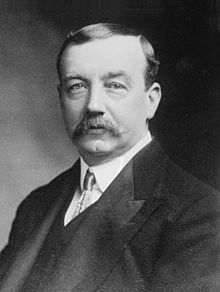Arthur Henderson
Arthur Henderson (born September 13, 1863 in Glasgow , † October 20, 1935 in London ) was a British politician. He was awarded the Nobel Peace Prize in 1934 for his work as chairman of the Geneva Disarmament Conference .
life and work
Arthur Henderson was the son of a cotton spinner and was born in Glasgow, Scotland , in 1863 . After attending school in Newcastle-upon-Tyne , he became an iron caster. In his profession, he joined the union early on and was also active in regional politics - initially in the Liberal Party . In 1892 he became a union delegate for Northumberland , Durham, Lancashire and Newcastle City Council. He was secretary and from 1908 chairman of the arbitration committee for the northern coastal districts. Henderson was a Methodist and a member of the social and non- denominational Brotherhood movement founded in 1875 and its president from 1914 to 1915.
In 1900 he was present at the founding of the Labor Representation Committee , the predecessor of the British Labor Party founded in 1906, and subsequently took an active part in building the new party. In 1903 he was elected treasurer of the alliance and became a member of the lower house in a by-election that same year . With several interruptions he was a member of the House of Commons until 1935. During this period he served as Chief Whip of Parliament in 1914, 1921-1923 and 1925-1927 . From 1908 to 1911 and later twice from 1914 to 1922 and 1931 to 1934 he was chairman of the party, from 1908 to 1910 and from 1914 to 1917 also chairman of the parliamentary group. He held the office of General Secretary from 1912 to 1934.
Henderson was - in contrast to his predecessor Ramsay MacDonald , who resigned because of this - not a fundamental opponent of British entry into the First World War . From May 1915 to August 1917 he was a member of the cabinets of Herbert Henry Asquith and David Lloyd George as Minister of Education and advisor on workers' issues. In 1917 he toured revolutionary Russia and subsequently resigned from parliament because the peace conference in Stockholm was not supported by the British government.
In 1918, Henderson and Sidney Webb tried to turn the Labor Party, which had previously existed as an amalgamation of various workers' organizations, into a tightly organized party with a socialist profile. With the majority of party members, he formed the London International , which later became the Socialist International . Henderson was chairman of this group from 1923 to 1924 and from 1925 to 1929. He declined to collaborate with the Communist International and the Communist Party of Great Britain .
In 1924, the Labor Party under Prime Minister Ramsay MacDonald set up the government for the first time, with Henderson serving as Minister of the Interior from January 23, 1924 to November 4, 1924. In this capacity he participated in the Geneva Protocol on Disarmament Issues . In MacDonald's second cabinet, he was foreign minister from June 8, 1929 to August 24, 1931 . In this function he was involved, among other things, in the Hague Conferences on the reorganization of reparation payments of the German Reich and in the Naval Conference of 1930. In 1929 Great Britain resumed diplomatic relations with the Soviet Union for the first time under his aegis . In 1931 Henderson was again chairman of the Labor Party after he had previously been the only one to vote against the expulsion of the group around his predecessor MacDonald and Philip Snowden , which, without the backing of the party, joined forces with the Conservatives to form a "national government" under MacDonalds Leadership had determined.
From 1932 to 1933 Henderson took part as president of the Geneva Disarmament Conference, in which he also played a central role in terms of content. Especially for this he was honored with the Nobel Peace Prize in the following year 1934.
Fonts
- The Aims of Labor. Headley Bros., London undated (1917).
- Labor and Foreign Affairs. Labor Party, London undated (around 1922).
literature
- Otfried Dankelmann: Arthur Henderson. In: Heinz Tillmann u. a. (Ed.) Biographies on World History , Lexicon, VEB Deutscher Verlag der Wissenschaften, Berlin 1989, ISBN 3-326-00218-1 ; Federal German license edition: Pahl-Rugenstein, Cologne 1989, ISBN 3-7609-1185-4 , pp. 235f.
- Bernhard Kupfer: Lexicon of Nobel Prize Winners. Patmos, Düsseldorf 2001, ISBN 3-491-72451-1 .
- Fred M. Leventhal: Arthur Henderson. Manchester University Press, Manchester u. a. 1989, ISBN 0-7190-2150-2 .
- Neil Riddell: Arthur Henderson. In: Kevin Jefferys (Ed.): Leading Labor. From Keir Hardie to Tony Blair. IB Tauris, London a. a. 1999, ISBN 1-86064-453-8 , pp. 41-60.
- Henderson, Arthur . In: Encyclopædia Britannica . 11th edition. tape 31 : English literature - Oyama, Iwao . London 1922, p. 366 (English, full text [ Wikisource ]).
Web links
- Information from the Nobel Foundation on the awarding of the 1934 prize to Arthur Henderson
- Newspaper article about Arthur Henderson in the 20th century press kit of the ZBW - Leibniz Information Center for Economics .
| personal data | |
|---|---|
| SURNAME | Henderson, Arthur |
| BRIEF DESCRIPTION | British politician, Member of the House of Commons, Nobel Peace Prize Laureate |
| DATE OF BIRTH | September 13, 1863 |
| PLACE OF BIRTH | Glasgow |
| DATE OF DEATH | October 20, 1935 |
| Place of death | London |
